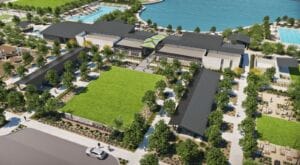It’s easy to take notice of all of the events and programs that the Arizona Chapter of NAIOP has going on. While the mixers and Night at the Fights are popular and enjoyable for the NAIOP membership, it’s the work that the members don’t see that is perhaps the most vital part of NAIOP’s mission.
NAIOP’s work locally at the Arizona Legislature and nationally in Washington, DC promotes the interests of the commercial real estate industry. NAIOP’s Arizona Chapter president Suzanne Kinney works closely with the NAIOP board of directors and public policy committee members to develop policy positions and strategy to address those issues with Arizona officials.
“NAIOP’s public policy positions at the state level are developed based on a view toward helping Arizona’s economy thrive in a manner that drives demand for commercial real estate development,” said Jeffrey Sandquist, director at Veridus LLC, a government relations advocacy firm in Phoenix that assists NAIOP with governmental affairs.
In Arizona, the large influx of new residents has provided a lot of opportunities for commercial real estate companies. That population shift, however, has had other effects that NAIOP has watched closely at the Arizona statehouse.
“In the last five to 10 years, the voters have moved Arizona from a consistently conservative state towards the middle,” Sandquist said. “You can see this in the makeup of the Arizona Legislature, the congressional delegation moving to a 5-4 Democrat to Republican split and by the 3-2 Republican to Democratic split among the five, major statewide offices.
“This shift has required organizations like NAIOP to be even more mindful of the importance of bipartisan support where possible and building coalitions to advance or defeat legislation.”
Sandquist said that NAIOP’s top priority continues to be opposition to new taxes, fees and other regulatory burdens for the commercial real estate industry. NAIOP has worked hard to protect the GPLET economic development tool and ensuring it is utilized property. NAIOP is also focused on promoting initiatives that will improve education in Arizona, as well as workforce training.
“A qualified, high-skilled workforce is key to attracting and growing businesses in Arizona,” Sandquist said. “NAIOP supports policies that increase education funding and improve K-12 and university outcomes, provided they do not increase costs on the commercial real estate industry.”
Education funding remains a looming issue for NAIOP in Arizona, and the organization is active in helping come up with solutions that do not stifle development. Sandquist also noticed that NAIOP is working to ensure that the enacted reforms to the municipal Speculative Builders tax are effective.
Sandquist did point out that, by and large, Arizona’s political climate is very positive for developers, but more can be done.
“Arizona is indeed very business-friendly and we applaud Arizona’s leaders for their focus on this goal,” Sandquist said. “However, we can always improve. Commercial property taxes remain very high compared to residential property taxes, and NAIOP members have had to wrestle with complicated and opaque local taxes. We encourage our elected leaders to continue to improve in these areas while preserving the great progress the state has already made.”
While Kinney, with ample help from Veridus, monitors and works on policy for the Phoenix market, NAIOP is very active in Washington to promote the interests of the group on a national scale. NAIOP’s Government Affairs office is led by Aquiles Suarez, the vice president for government affairs, Toby Burke, senior director of state and local affairs, Alex Ford, director of federal affairs, and Richard Tucker, director of public policy communication.
On national level policy issues, NAIOP strives to identify policies that will help the membership succeed and seeks the consultation from standing committees that are made up of NAIOP members.
“If a member identifies a problem, we can go to the committee and find out how members in other states are dealing with the same thing,” said Tucker. “Sometimes, that may be obvious: lower tax rates and a reduction in regulatory red tape are two things that are important to anyone in business, so we’ll advocate for those.
“Those committee members play a key role in helping us understand the real-world implications of proposed legislation, and ultimately formulate a position that is beneficial to the industry as a whole.”
Tucker said that on a national level, the key issues for NAIOP are Infrastructure and transportation, tax policy and energy efficiency and the environment.
“The first two issues are primarily congressional, and the third is a mix between the legislative and executive branch,” Tucker said. “On the first two, we meet with members of Congress and their staff to discuss what good policy should look like. We also host fly-ins, where NAIOP members from particular states come to D.C. and meet with representatives and senators from their state to provide a firsthand account of how these issues impact them.”
On energy and the environment, Tucker noted that NAIOP will participate in the regulatory review process by drafting letters to EPA and other agencies that explain what good policy, that protects the environment while also allowing necessary development, looks like. NAIOP will also advocate for laws that provide incentives for sustainability and energy efficiency in buildings, rather than those which impose unachievable mandates. In all three cases, NAIOP works to shape public opinion. The organization can do that by writing blog posts and op-eds to run in important states and districts and educate the public about these issues.
Another national level issue that NAIOP has been helping advance is transportation and infrastructure initiatives. NAIOP knows that an effective infrastructure network is crucial to boosting property values and improving supply-chain operations and productivity. Tucker said NAIOP is in support of federal funding for important projects and the expanded use of innovative funding mechanisms, such as public-private partnerships.
“Just before the August recess began, the Senate Committee on Environment and Public Works voted unanimously to advance a $287 billion highway bill,” Tucker said. “The measure also has support in the House of Representatives and the White House. When lawmakers return after Labor Day, the Senate Finance Committee will consider ways to pay for the highway bill. NAIOP will encourage lawmakers to fully fund crucial projects.”
With national elections quickly approaching in 2020, Tucker said NAIOP does not see the need to alter its approach to advocacy as the political parties trade control from election cycle to election cycle.
“The leadership in the White House or Congress may change from election to election, but that doesn’t alter NAIOP’s approach,” Tucker said. “We work with members of both parties and with career regulators in the executive branch to advance good policies that support a healthy American economy in a responsible, balanced way.”




